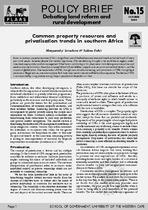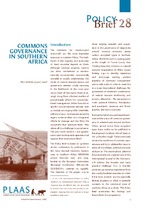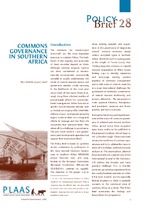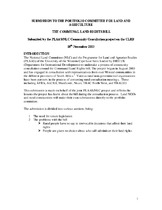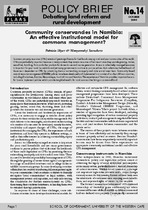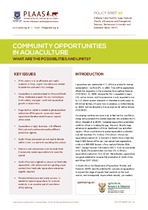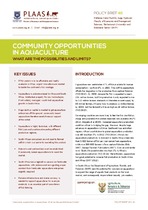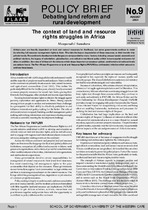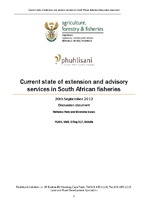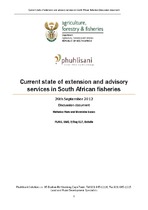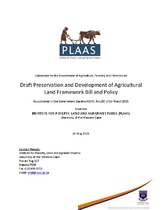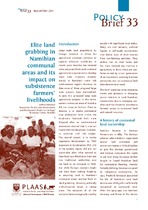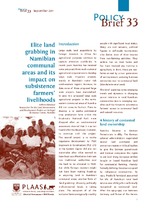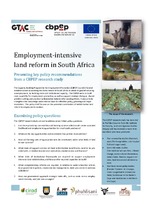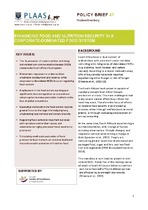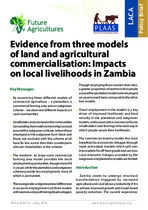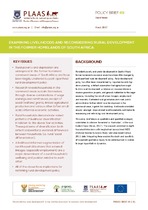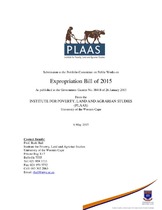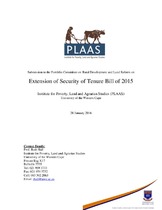Browsing Policy Briefs by Title
Now showing items 15-34 of 144
-
Common property resources and privatisation trends in Southern Africa
(Institute for Poverty, Land and Agrarian Studies, University of the Western Cape, 2004)Access to common property resources (CPRs) is a significant part of the land resource base and therefore the livelihoods of many poor rural people. However, despite their central importance, CPRs are declining throughout ... -
Commons Governanace in South Africa
(Institute for Poverty, Land and Agrarian Studies, University of the Western Cape, 2009)The commons (or common-pool resources)1 are the most important resources in southern Africa. The livelihoods of the majority and economies of most countries depend on them. Although common property regimes are often ... -
Commons governance in Southern Africa
(PLAAS, University of the Western Cape, 2009-06-28)This Policy Brief is based on synthetic studies undertaken by participants in the Cross Sectoral Commons Governance in Southern Africa (CROSCOG) project between 2007 and 2009, funded by the European Commission (European ... -
The Communal Land Rights Bill
(Institute for Poverty, Land and Agrarian Studies, University of the Western Cape, 2003)Tenure legislation is urgently necessary. There are serious problem in the communal areas in the ex-homeland provinces. These areas are characterised by severe poverty, overcrowding and isolation from economic growth and ... -
Community conservancies in Namibia: An effective institutional model for commons management?
(Institute for Poverty, Land and Agrarian Studies, University of the Western Cape, 2004)Common property resources (CPRs) remain of great significance for livelihoods among rural and poor communities of the world. CPRs are particularly important because in many contexts they remain resources of last resort ... -
Community opportunities in aquaculture, What are the possibilities and limits?
(Institute for Poverty, Land and Agrarian Studies, University of the Western Cape, 2016)Aquaculture now contributes 47% of fish available for human consumption – up from 9% in 1980. This shift to aquaculture offsets the stagnation in the production from capture fisheries (FAO 2012). By 2030, demand for ... -
Community opportunities in aquaculture: what are the possibilities and limits?
(Institute for Poverty, Land and Agrarian Studies, University of the Western Cape, 2016)Aquaculture now contributes 47% of fish available for human consumption – up from 9% in 1980. This shift to aquaculture offsets the stagnation in the production from capture fisheries (FAO 2012). By 2030, demand for ... -
The context of land and resource rights struggles in Africa
(Institute for Poverty, Land and Agrarian Studies, University of the Western Cape, 2004)Africa’s poor are heavily dependent on land and natural resources for livelihood, but some governments continue to resist transferring full resource management rights to them. This risks the loss or degradation of these ... -
Current state of extension and advisory services in South African fisheries
(Institute for Poverty, Land and Agrarian Studies, University of the Western Cape, 2012)The fishing industry can be divided into marine, recreational, aquaculture and inland sub-sectors. The marine sub-sector is the main commercial fishing sector comprised of industrial fishing and also smallscale fishing, ... -
Current state of extension and advisory services in South African fisheries
(Institute for Poverty, Land and Agrarian Studies, University of the Western Cape, 2012)The fishing industry can be divided into marine, recreational, aquaculture and inland sub-sectors. The marine sub-sector is the main commercial fishing sector comprised of industrial fishing and also smallscale fishing, ... -
Draft Preservation and Development of Agricultural Land Framework Bill and Policy
(Institute for Poverty, Land and Agrarian Studies, University of the Western Cape, 2015)The Institute for Poverty, Land and Agrarian Studies (PLAAS) is a constituent unit of the School of Government at the University of the Western Cape. PLAAS engages in research, training, policy development and advocacy ... -
Elite land grabbing in Namibian communal areas and its impact on subsistence farmers’ livelihoods
(PLAAS, University of the Western Cape, 2011)This brief examines some emerging trends and dynamics in changing power relations in rural Namibian communities due to emerging new elites and the threats to subsistence farmers’ access to communal land and ... -
Elite land grabbing in Namibian communal areas and its impact on subsistence farmers’ livelihoods
(Institute for Poverty, Land and Agrarian Studies, University of the Western Cape, 2011)Large scale land acquisitions by foreign investors in Africa for agricultural purposes continue to capture attention worldwide. In recent years Namibia has received some proposals from multi-national agricultural ... -
Employment-intensive land reform in South Africa
(GTAC, 2020)The Capacity Building Programme for Employment Promotion (CBPEP) is an EU-funded initiative aimed at assisting the Government of South Africa to attain its goal of reducing unemployment, by building state and institutional ... -
Enhancing food and nutrition security in a corporate-dominated food system
(Institute for Poverty, Land and Agrarian Studies, University of the Western Cape, 2017)South Africa faces a ‘dual burden’ of malnutrition, with persistent under-nutrition coinciding with rising rates of diet-related NCDs (e.g. diabetes, heart disease, and certain cancers). According to a recent national ... -
Evidence from three models of land and agricultural commercialisation: Impacts on local livelihoods in Zambia
(Institute for Poverty, Land and Agrarian Studies, University of the Western Cape, 2016)Zambia needs to undergo structural transformation triggered by increased agricultural and rural labour productivity if it is to achieve improved growth and broad-based poverty reduction. The current experience, however, ... -
Evidence from three models of land and agricultural commercialization: Impacts on local livelihoods in Zambia
(Institute for Poverty Land and Agrarian Studies (PLAAS), 2016)The approach favoured by most donors is to stimulate growth in smallholder agriculture by a variety of interventions ranging from production technology to market development. Some, however, contend that agricultural ... -
Examining livelihoods and reconsidering rural development in the former homelands of South Africa
(Institute for Poverty, Land and Agrarian Studies, University of the Western Cape, 2017)Persistent poverty and under-development in South Africa’s former homeland communal areas have been little changed by post-apartheid ‘rural development’ policy. Rural development policy has often been characterised by ... -
Expropriation Bill of 2015
(Institute for Poverty, Land and Agrarian Studies, University of the Western Cape, 2015)The Institute for Poverty, Land and Agrarian Studies (PLAAS) is a constituent unit of the School of Government at the University of the Western Cape. PLAAS engages in research, training, policy development and advocacy ... -
Extension of Security of Tenure Bill of 2015
(Institute for Poverty, Land and Agrarian Studies, University of the Western Cape, 2016)The Institute for Poverty, Land and Agrarian Studies (PLAAS) welcomes the initiative to amend the Extension of Security of Tenure Act, 62 of 1997. PLAAS is a constituent unit of the School of Government at the University ...

